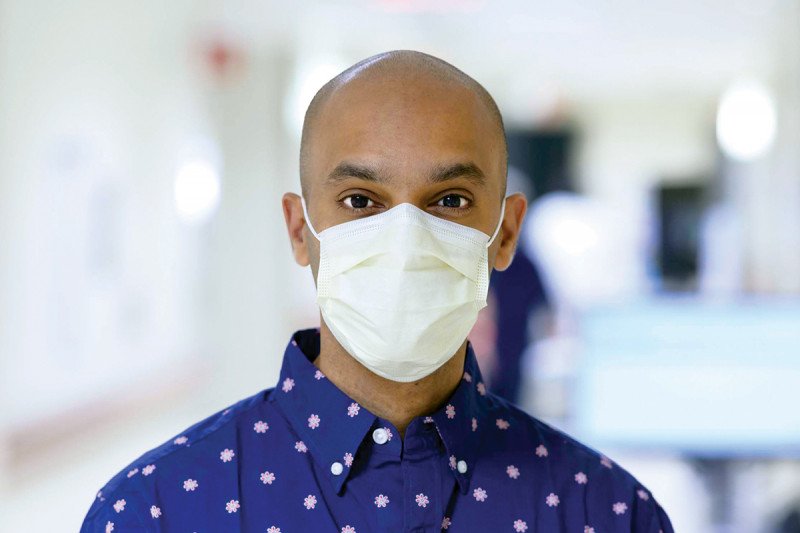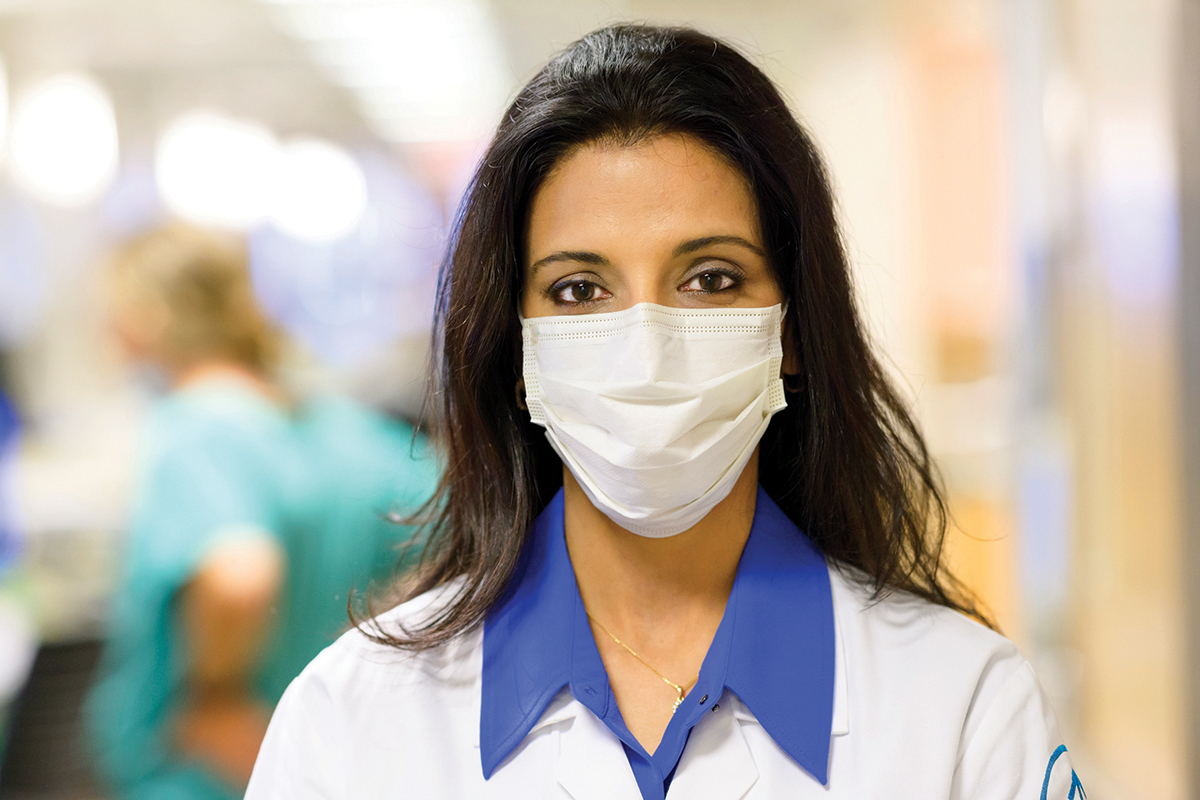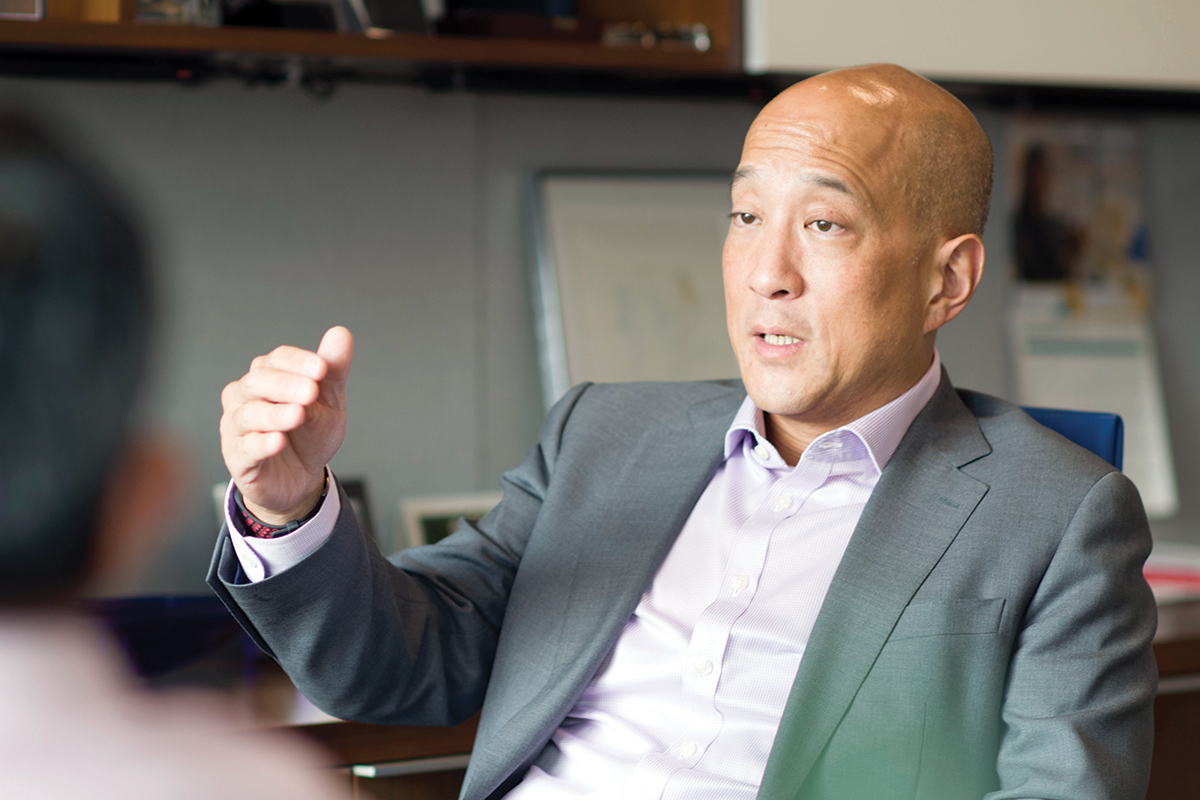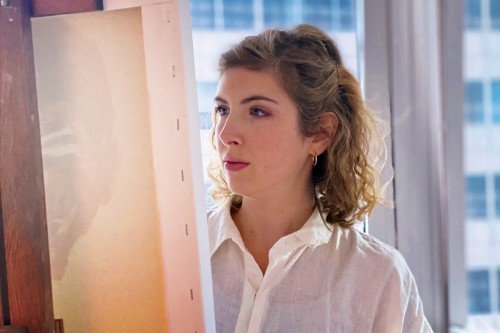
In March 2020, medical oncologist Santosha Vardhana was faced with a new challenge: Many of his patients with lymphoma were becoming infected with the COVID-19 virus. As he saw more cases, Dr. Vardhana noticed a troubling pattern begin to emerge. Patients were managing well through the initial stage of infection but then got progressively worse. Many of them suffered irreversible lung damage.
“The longer they were sick with COVID-19, the harder it was for the immune system to fight back at all,” says Dr. Vardhana, who also conducts research in the lab of Memorial Sloan Kettering President and CEO Craig B. Thompson. “There was a desperate need to find a way to help them get better.”
Dr. Vardhana wondered if people with lymphoma were especially susceptible to the virus. Lymphoma is a disease of the body’s immune system — it cripples the very thing that fights off an infection such as COVID-19.
He looked for clues in his patients’ blood tests. What he found was that while the cancer was suppressing one arm of the immune system, COVID-19 was depleting another part of it. This perfect storm is what was allowing the virus to persist, causing extreme damage to the lungs. Meanwhile, MSK immunologist and medical oncologist Jedd Wolchok was thinking about this problem and how it intersected with MSK’s long-term commitment to studying immunotherapy and immunology.
“We quickly began to strategize about how we could use our knowledge of the immune system and medicines that affected it to try and enhance the response to COVID-19,” Dr. Wolchok says.
The pair brainstormed and came up with an inspired solution: a drug called N-acetylcysteine, which is used to treat people with cystic fibrosis, a disorder of the lungs and digestive system. They thought that if the drug could help restore lung tissue in those patients, it might be able to help people with COVID-19 too.
They swiftly designed a clinical trial at MSK to test their theory.
“Everyone here worked together to get this trial going quickly, from the Institutional Review Board that approved the study to the nursing staff that learned how to administer the drug,” Dr. Vardhana says.
Today, MSK continues to play a crucial role in the global effort against COVID-19. Doctors and researchers from across the institution have drawn on their vast experience in fields from biology and immunology to chemistry and more to achieve one simple goal: learn how the virus affects the body so they can better care for patients.
Don’t Delay
As the pandemic surged in New York City in March, Drs. Vardhana and Wolchok were right to be concerned about their patients. Cancer therapies, especially chemotherapy, can lower a person’s immune defenses and make them susceptible to infections.
“For many of our patients, cancer care was suspended,” says MSK Chief Medical Epidemiologist Mini Kamboj. “And rightly so, given the uncertainty of the situation.”
But cancer care can’t wait. MSK doctors felt the urgency to get answers about COVID-19 and safely resume treatments as soon as possible.
“It was so palpable how little we knew in March going into April,” says Ying Taur, an infectious disease specialist. Colleagues at MSK and other institutions were phoning him for advice: When would it be safe to have patients come in for treatment? With each call, he gave an honest answer: He didn’t know. But he also knew that wasn’t good enough.
Drs. Kamboj and Taur set out to get a clearer picture of the actual treatment risks. They launched a study looking at more than 400 MSK patients in active cancer treatment who were diagnosed with COVID-19 between March 10 and April 7. One key aspect of the research was that they followed the patients for 30 days after their COVID-19 treatment ended.
What they found was encouraging: For most adults, chemotherapy didn’t seem to make COVID-19 any worse.
“If you’re an oncologist and you’re trying to figure out whether to give patients chemotherapy, or if you have cancer, these findings should be very reassuring,” Dr. Taur says. “People should not delay cancer treatment.”
The study was published in June in Nature Medicine.
Drs. Kamboj and Taur caution that there are still some questions. There was some evidence in their research that people treated with checkpoint inhibitors (which work by releasing the brakes on the immune system to attack cancer) had an increased risk of severe breathing problems. There is also a need for a deeper dive into patient outcomes for individual cancers.

Unique Expertise
A COVID-19 infection still is complicated for people with cancer. It can cause a wide range of symptoms, from fever to inflammation to difficulty breathing. But MSK doctors are tackling these problems by applying lessons already learned from addressing similar symptoms caused by cancer or its treatments.
“Our experience in caring for people with cancer — and in how the immune system behaves — has given us ideas for how to overcome some of these challenges,” Dr. Vardhana says.
It’s understood in the medical community that some of what makes COVID-19 so damaging to the body is not just the infection itself. An overzealous immune system is also to blame — it works too hard and starts damaging the body. MSK specialists are familiar with this phenomenon: They’ve seen it occur in some people who receive a type of immunotherapy called chimeric antigen receptor (CAR) T cell therapy.
CAR T cell therapy was pioneered at MSK, so doctors here are especially proficient at minimizing and treating an extreme immune system response, even in the most severe cases. “This expertise has helped enormously as we try to prevent similar damage in COVID-19 patients,” says MSK medical oncologist Jae Park.
Blood cancer specialists Boglarka Gyurkocza and Ann Jakubowski are leading a new effort to tamp down the excessive immune response. They started a clinical trial at MSK that tests whether a drug called tocilizumab (Actemra®) can minimize damage to the lungs and other organs in COVID-19 patients. Tocilizumab is an immunosuppressive drug, meaning it slows down immune system activity and prevents it from going into overdrive. It is approved by the US Food and Drug Administration to treat several forms of arthritis.
“This drug targets a specific inflammatory molecule that is detected at high levels in people with COVID-19 infections,” Dr. Gyurkocza says. “We think therapies like this, combined with other approaches that can enhance tissue repair or target the virus directly, could bring substantial improvements for patients.”
Moving Forward
But what about a vaccine? That’s the real hope for bringing COVID-19 under control.
To develop a vaccine against COVID-19, the worldwide scientific community first needs a clear picture of how the immune system responds to the virus. That response is often understood through antibody testing.
To an average person, a COVID-19 antibody test tells them whether they previously had the virus. To a scientist, antibody test results tell a deeper story.
It’s like the difference between looking solely at a baseball team’s win-loss record, versus scrutinizing individual batting averages, home run totals, and strikeout rates in order to understand why the team didn’t make the playoffs.
At MSK, physician-scientist Michael Glickman and structural biologist Christopher Lima are committed to that deeper story behind a COVID-19 antibody test. They work with MSK’s Antibody & Bioresource Core Facility and Immune Monitoring Core Facility and started creating a COVID-19 antibody test in February.
Their test detects and measures three antibody types, one of which frequently blocks a virus from entering healthy cells. This is known as a neutralizing antibody. The most effective vaccines, such as those for polio and measles, stimulate the body to produce these types of antibodies, according to Dr. Glickman.
“A COVID-19 vaccine, when it’s created, will likely work by causing the body to produce neutralizing antibodies, as well as other types of immunity,” he says. “An antibody test like the one created by MSK could provide clues into what that effective response looks like.”
When a virus like COVID-19 enters the human body, the immune system responds instantly, with no time to lose.
That, too, is how the MSK community reacted to COVID-19.
Kids with Cancer Are Not at an Increased Risk of COVID-19 Infection

In March and April, Andrew Kung led a study in MSK’s Department of Pediatrics that provided great reassurance to people concerned about COVID-19 in children with cancer. He and his collaborators found that children with cancer are no more likely than other kids to be affected by COVID-19. The research, published in May in JAMA Oncology, was the first in the United States concerning COVID-19 in children with cancer.
“Despite some fears that children might be a reservoir of COVID-19 infection, we found that kids have lower rates of infection than adults,” says Dr. Kung, Chair of the Department of Pediatrics. The study came to another encouraging conclusion: If kids with cancer did become infected with COVID-19, they typically had only mild symptoms, did not have to be hospitalized, and were able to recover at home.
Dr. Kung says these findings allow for a sigh of relief: “This means we can continue lifesaving cancer therapy with standard precautions and safeguards but without heightened concern about adverse outcomes due to COVID-19 infection.”


